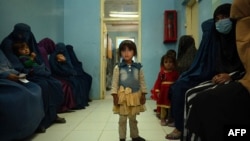For years, Qari Wazir Mohammad and his six siblings received assistance from the Swedish Committee for Afghanistan, or SCA, enabling all seven of them to read Braille and perform daily tasks such as cooking and cleaning.
All born blind in a remote village of war-torn Ghazni province, the four brothers and three sisters faced extreme poverty and a lack of support for their disabilities.
Last year, the Taliban directed the SCA to halt humanitarian activities, including support programs for the disabled.
Taliban officials issued the order in protest of an Iraqi Christian refugee who burned a copy of the Quran in Sweden. That refugee, Salwan Momika, has since reportedly left Sweden, but the ban remains in place, depriving tens of thousands of disabled Afghans of the SCA’s critical assistance services.
“We have clarified our status as an independent NGO and our condemnation of the events in Sweden that led to our suspension,” Andreas Stefansson, secretary general of the SCA, told VOA in written comments.
The SCA
With a $40 million budget for 2023, the SCA, which remained active throughout several cycles of armed conflict in Afghanistan over the past four decades, had 7,000 local and 15 international staff servicing vulnerable communities nationwide.
“Many of our staff are the sole breadwinners of large extended families,” said Stefansson, adding that one-third of SCA employees were female.
Despite being forced to suspend its operations for nearly a year, the organization has continued paying salaries of many of its local employees.
Taliban restrictions
Since seizing power in 2021, the Taliban have relentlessly restricted the work of local and international aid agencies in Afghanistan.
Last year, the Taliban's ban on Afghan women working for aid agencies led several international NGOs to temporarily suspend operations in protest.
Other restrictions have also been reported.
Humanitarian organizations in Afghanistan reported 1,775 incidents of bureaucratic and administrative impediments and restrictions imposed on their work in 2023, according to the United Nations.
The restrictions come amid an environment of prevalent need.
“An estimated 23.7 million people — more than half of the population — will require humanitarian assistance in 2024,” the U.N. secretary-general said in a report last month.
The situation in Afghanistan is expected to deteriorate further as Pakistan sends hundreds of thousands of refugees home. More than 3 million Afghans are still in Pakistan, facing forced return to a country already grappling with poverty and the aftermath of war.
Isolated under Taliban rule, Afghanistan has suffered significant reductions in donor funding.
Last year, the U.N.-led humanitarian appeal received about half of its needed $3.2 billion. As of April, this year’s appeal has received 7% of its needed funds.
Stefansson says his organization has been in dialogue with Taliban authorities to lift the ban.
Taliban officials have not commented on when or if the SCA's operations in Afghanistan might resume.
“We implore leaders of the Islamic Emirate of Afghanistan to allow the Swedish committee to resume its activities,” said Qari Wazir Mohmmad of Ghazni. “Without their assistance, our lives are destroyed.”






